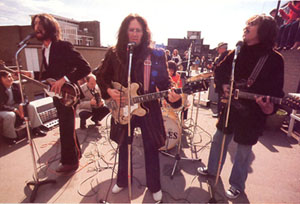 The Rutles: All You Need is Cash (1978) I've seen this movie scores of times, with much if diminishing enjoyment over the years. It holds up as a lesser Monty Python sketch crossed with an inspired "Saturday Night Live" sketch, and your interest level entirely depends on how steeped you are in Beatles lore. The parody is so deep and specific that you'd have to know pretty obscure details of the Fab Four mythos to catch everything ("Dick Jaws" is based on music publisher Dick James … not exactly a belly-laugh of a punchline). And much of Idle's tomfoolery is as hammy as a typical McCartney interview. But these are quibbles. If you get the Rutles, you really get the Rutles. You'll laugh, you'll catch all sorts of amazing details, you'll marvel at the spot-on and frequently kind of savagely evocative songs (provided by former Bonzo Dog Band genius Neil Innes). You'll smirk at the smirking interviews with Mick Jagger and Paul Simon, who each dissect the "Rutles" phenomenon, and you'll flutter when George Harrison shows up for a cameo. Everyone else will mainly enjoy spotting classic-era "SNL" personalities (Gilda Radner, John Belushi, Bill Murray, Dan Aykroyd, Lorne Michaels, and even a very brief Al Franken) and laughing at the non-Beatle-specific silliness. This time around, I was struck by how un-hilarious it all is, actually more of an homage than a satire. But it still hit me in all the right places. The DVD adds some outtakes and director's commentary by Idle, which at this point I'd probably get more out of than the film's content itself. All You Need is Cash is essential, yeah – though increasingly in the historical sense, as opposed to the pure enjoyment sense.
Review by Posdnuos G. Harding |